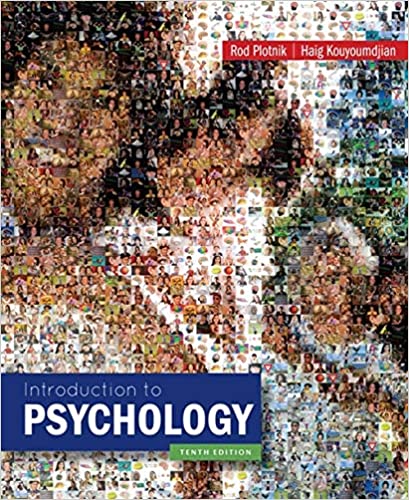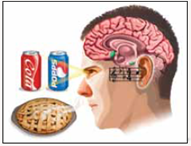
Introduction to Psychology 10th Edition by Rod Plotnik,Haig Kouyoumdjian
Edition 10ISBN: 978-1133939535
Introduction to Psychology 10th Edition by Rod Plotnik,Haig Kouyoumdjian
Edition 10ISBN: 978-1133939535 Exercise 23
Marketing Changes Your Brain
What guides your preference for Coke or Pepsi? McDonald's or Burger King? Can these choices be explained as a matter of taste preference, or is there something occurring in the brain that makes us choose one over the other? Neuroscientists have been discovering how marketing companies direct us to choose their products. Take, for instance, Coke ® and Pepsi ® , which are almost identical chemically and physically, yet people usually have a strong preference for one over the other. In one study, researchers found that when participants didn't know which brand of cola they were drinking, they were equally likely to choose Coke or Pepsi as their favorite. Also, the part of the brain that responds to rewards or pleasure was activated as they drank either cola. When participants had knowledge about which cola they were drinking, they were more likely to prefer Coke and their brain activity explains why-not only was there increased activity in the part of the brain that responds to rewards, but memory-related brain regions involved in recalling cultural influences were also activated. The same was not true for Pepsi. These results suggest that the marketing messages about brands of cola influence our brains in a way that likely alters our taste perception or preference. We've seen how marketing influences us to purchase a particular cola, but are marketing techniques aimed to get us to quit using addictive drugs powerful enough to change our behavior? Researchers found that warning labels on cigarette packs actually stimulate the pleasure area of the brain, which brings on cigarette cravings. The warning labels are aimed to reduce smoking, but they may just increase profits for tobacco companies! Marketing companies also take advantage of our hearing to get us to make purchases. In one study, shoppers purchased wines from different countries based on the music being played at the store. Shoppers were more likely to purchase French wine when French music was played and more likely to purchase German wine when German music was played. And, let's not forget about smell. Smell, more than any other sense, is connected to the brain areas that process motivations and emotions. This means that if businesses use attractive scents, we may make purchases based on impulse rather than rational thought. This is why supermarkets place their bakery near the entrance. The smell of fresh oven-baked bread or pies puts a big smile on our faces and activates the emotional centers in our brain. Consequently, we are likely to spend more money while shopping. By applying neuroscience to marketing, we now better understand the complex, mostly unconscious forces that influence our preferences and purchase decisions. The question remains, however: Now that we know about these clever marketing techniques, can we resist these powerful influences when making purchasing decisions, or will many of our buying decisions continue to take place deep below our conscious awareness?
Question
Why was the part of the brain that responds to rewards activated?
What guides your preference for Coke or Pepsi? McDonald's or Burger King? Can these choices be explained as a matter of taste preference, or is there something occurring in the brain that makes us choose one over the other? Neuroscientists have been discovering how marketing companies direct us to choose their products. Take, for instance, Coke ® and Pepsi ® , which are almost identical chemically and physically, yet people usually have a strong preference for one over the other. In one study, researchers found that when participants didn't know which brand of cola they were drinking, they were equally likely to choose Coke or Pepsi as their favorite. Also, the part of the brain that responds to rewards or pleasure was activated as they drank either cola. When participants had knowledge about which cola they were drinking, they were more likely to prefer Coke and their brain activity explains why-not only was there increased activity in the part of the brain that responds to rewards, but memory-related brain regions involved in recalling cultural influences were also activated. The same was not true for Pepsi. These results suggest that the marketing messages about brands of cola influence our brains in a way that likely alters our taste perception or preference. We've seen how marketing influences us to purchase a particular cola, but are marketing techniques aimed to get us to quit using addictive drugs powerful enough to change our behavior? Researchers found that warning labels on cigarette packs actually stimulate the pleasure area of the brain, which brings on cigarette cravings. The warning labels are aimed to reduce smoking, but they may just increase profits for tobacco companies! Marketing companies also take advantage of our hearing to get us to make purchases. In one study, shoppers purchased wines from different countries based on the music being played at the store. Shoppers were more likely to purchase French wine when French music was played and more likely to purchase German wine when German music was played. And, let's not forget about smell. Smell, more than any other sense, is connected to the brain areas that process motivations and emotions. This means that if businesses use attractive scents, we may make purchases based on impulse rather than rational thought. This is why supermarkets place their bakery near the entrance. The smell of fresh oven-baked bread or pies puts a big smile on our faces and activates the emotional centers in our brain. Consequently, we are likely to spend more money while shopping. By applying neuroscience to marketing, we now better understand the complex, mostly unconscious forces that influence our preferences and purchase decisions. The question remains, however: Now that we know about these clever marketing techniques, can we resist these powerful influences when making purchasing decisions, or will many of our buying decisions continue to take place deep below our conscious awareness?

Question
Why was the part of the brain that responds to rewards activated?
Explanation
The brain regions which are involved in ...
Introduction to Psychology 10th Edition by Rod Plotnik,Haig Kouyoumdjian
Why don’t you like this exercise?
Other Minimum 8 character and maximum 255 character
Character 255


